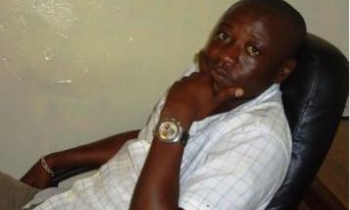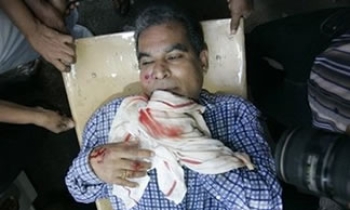"What if Rupert is hit by a bus tomorrow?" That’s a question that recurs when the subject of Rupert Murdoch and the future of his global, Rube Goldberg empire comes up. What happens to News Corporation, the Brobdingnagian contraption he virtually willed into existence by the power of his ingenuity and his willingness to place huge, risky bets? More than any other media baron Murdoch is the walking, breathing incarnation of his company, which more than once has seemed a house of cards, and which came close to bankruptcy in the early 1990s. The question comes up more frequently these days, prompted by two factors. The first is an odd move last November by John Malone, the Denver-based media billionaire, whose purchase of a large chunk of stock suggested he might be contemplating a takeover of News Corporation. The second is the natural passage of time, and the speculation that if Rupert Murdoch departs this mortal coil nobody, including his sons, will truly understand the company well enough to run it.
So at seventy-three, bus or no bus, Murdoch faces the inevitable task of assuring News Corporation’s good health after he ends a career that began at age twenty-two when he inherited a provincial newspaper in Australia in 1952. He’s now the master of a $54 billion domain. Already onstage are two of Murdoch’s six children (by three marriages): Lachlan, thirty-three, the deputy chief operating officer, who runs the Fox television stations, the New York Post, and HarperCollins; and James, thirty-one, the c.e.o. of British Sky Broadcasting (BSkyB), the company’s satellite TV service in Britain. Murdoch is determined that control of News Corporation remain in his family.
That determination took a sucker punch in November when Malone – an ally of Murdoch in previous deal-making – suddenly, and without informing his sometime partner, increased his stake in the company from 9 percent to 18 percent. The move was seen as threatening the Murdoch family’s control of the company. This rattled Murdoch, and sent him scampering to erect a Maginot Line in the form of a "poison pill," a familiar corporate tactic aimed at preventing a hostile takeover.
The question became: Does Malone, who is a decade younger than Murdoch, really intend – through his crazy quilt of a holding company, Liberty Media Corporation (MacNeil-Lehrer Productions, Court TV, Discovery Communications) – to grab control? Most Wall Streeters don’t think so. And yet Malone is famous as a merciless dealmaker – the "Darth Vader of the industry, the king of the Cable Cosa Nostra," as former Vice President Al Gore once described him. Malone insisted to The Wall Street Journal> in March: "I would die rather than do anything to hurt Rupert." Maybe so, but on March 29, Malone exacerbated the standoff when he told a Bank of America conference in New York that he might "hold and enhance" his News Corporation stock ownership, "or find a way to distribute the position to shareholders. There are lots of options including the status quo." The reason for his November surprise, said Malone, was "to enhance the willingness of the News Corporation board to explore transactions that would be favorable to Liberty."
I asked Andrew Baker, a media analyst at Cathay Financial, whether Murdoch – who actually holds a comparatively slim 29.5 percent of News Corporation – is well defended to repel boarders who might threaten his plans for succession. "Twenty-nine and a half percent is by no means security for him," Baker said. "It was in the past, when no one else had more than three or four percent of the votes. All of a sudden, you’ve got somebody out there owning a big chunk. If Liberty could get just a few of the largest institutional shareholders siding with it, they’d pretty much equal Murdoch’s size."
But does Malone want control? "News Corporation is so vast and so complicated, and so much a Murdoch construct, that someone stepping in from the outside might cause the whole company to collapse," says a veteran media reporter at a national publication, who requested anonymity. "Malone wouldn’t know what to do with News Corporation if he had it because its reach is so vast – the most international of the big media companies. I defy any outsider to figure out the accounting of that company."
But if getting one’s mind around News Corporation poses such a challenge for outsiders, what about insiders? Will they be able to hold it together when Rupert is gone? In 1999 editors at The Economist wondered: "Will Mr. Murdoch’s children, who he hopes will eventually run the company, be able to master its arcane complexity? If not, the empire, low taxes or not, could start to fall apart."
Indeed the strategy behind particular News Corporation acquisitions and start-ups can at times appear random and improvisatory. A News Corporation vice-president for planning, the late John Evans, once joked to me: "Just because we have a vice-president for planning doesn’t mean we have a plan." Currently, a welter of new ventures – including a possible business news channel to take on CNBC; a deal to provide news to the radio giant Clear Channel; a reality TV channel; a new magazine called Inside TV – suggest that the company is continuing this typical behavior.
Speculators may love to talk about it, but how News Corporation will fare after Murdoch is gone is a subject that the founder prefers not to discuss. (A company spokesman, Andrew Butcher, declined cjr’s request to interview Murdoch, his prospective heirs, or a non-family corporate executive for this article.) Murdoch did tell The New York Times’s David A. Kirkpatrick in December 2003 that he wanted to pass the company to his offspring: "I think it is a very, very human motive to see your work carried forward by one of your own." Among those heirs, Lachlan, a Princeton graduate, shares his father’s conservative politics, making him a logical suzerain for the right-wing New York Post. When younger, he was sometimes called scruffy, for his tattoos, louche hair-do’s, and fondness for motorcycles. He has, however, earned his spurs as a News Corporation yeoman, working in the company’s newspaper and television interests in Australia, Britain, and the U.S.
His brother James is openly liberal, was a Clinton-Gore supporter, is a Harvard dropout, and was once the proprietor of a hip-hop record label that did not prosper. (Its first release was by a band called Whoregasm.) He gets high marks for his management of BSkyB, causing some News Corp. watchers to wonder if he might leapfrog his older brother for the top job. There are other siblings. Elisabeth Murdoch, thirty-six, a Vassar graduate, full sister to Lachlan and James, may well play a significant role. She has worked in television in Australia and the U.S. and been a program executive at BSkyB. In 1998, she pondered the succession question in a talk with Forbes magazine. "Clearly, there will be a first among equals, but my brothers and I really are joined at the hip," she said. "That may actually make it easier to do what our dad does."
Prudence Murdoch MacLeod, forty-six, a product of marriage number one, lives in England with her three children and has shown no sign of wanting to work in the family business. Rupert Murdoch’s two children with current wife Wendi Deng are three and two.
Meanwhile, a viceroy, in the person of Peter Chernin, fifty-three, is in place. He’s the company’s president and c.o.o., a smooth, tough operative (a liberal Democrat, supporter of John Kerry) who could serve as temporary caretaker, but who knows he’ll never own the company.
So, what is the betting? The least plausible scenario by far is that Malone, in spite of his midnight raid, wants to run the company. More likely, he intends to use his newfound leverage for some serious mule-trading with Murdoch to improve the outlook for his own lashed-together Liberty Media.
Then, there’s the famous hit-by-a-bus scenario. News Corporation’s stock price will suffer should Murdoch depart the scene unexpectedly – precipitating, one analyst predicts, a "shareholder revolt," because serious investors hate uncertainty. But it would probably recover. News Corporation, says Cathay Financial’s Andrew Baker, is "certainly a great company, with a terrific stable of growing assets. Among all the media companies, it has probably the best outlook for growth because of its mix of mature businesses that provide a steady stream of cash flow, which they can use to plough into new businesses."
The most probable game plan is that the physically fit septuagenarian chairman will continue to prepare his offspring to take over the company in an orderly transition. What is certain is that after Murdoch departs, the company will never be the same. He has collected media properties the way Charles Foster Kane filled his mansion. Yet Murdoch also has created media assets virtually out of thin air – the Fox News Channel, the Fox Broadcast Network, satellite systems, regional sports networks, The Weekly Standard, the forthcoming business news and reality channels. Many of his critics scorn Murdoch for the brazenness of his right-wing journalism, yet they grudgingly admire his nerve. The conjurer himself told The New York Times in 2003: "If I go under a bus . . ." there’s that bus again. ". . . or my health fails," News Corporation will soldier on without him just fine. But he ended by saying: "I intend to be the active driver of the company for a long time yet, probably to the frustration of all my relatives."
Neil Hickey is a contributing editor to CJR.









